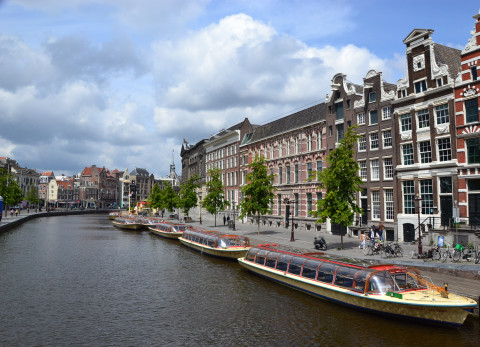The pandemic and the 'anthropause': European lessons for water managers
The pandemic and the 'anthropause': European lessons for water managers
Press inquiries
The COVID-19 pandemic presented scientists with a unique opportunity to study the effects of an ‘anthropause’: an abrupt reduction of, and/or alteration in, human activities. An international team of researchers led by NIOO's Lisette de Senerpont Domis looked at the impact on water-based ecosystems in the Netherlands. The European Commission has now published their findings.
Following the introduction of tough COVID-restrictions in March 2020, recreational boating on Amsterdam's famous canals ground to an almost complete halt. Lisette de Senerpont Domis and Maggie Armstrong (NIOO-KNAW) and their colleagues analysed boat-traffic data from the ‘Digital Canal’ programme, in which boats are fitted with trackers, and combined it with water transparency data from the Amstel, Gooi and Vecht water authority's monitoring programme.
Improving services
The researchers found that the reduction in boat traffic did indeed lead to clearer canal water (i.e. less suspended solid matter) compared to previous years. The resulting increase in light penetration permitted aquatic plants to establish, improving the ecosystem service of habitat.
"This anthropause was an unplanned experiment", says De Senerpont Domis. "It showed us what can happen if inland waters are used in a different way." But the pandemic also led to an increase in recreational fishing and swimming, activities that pose a risk of heightened ecosystem degradation. The increase in angling could negatively affect fish stocks, and self-stocking of angling or bait fish could affect food-web dynbamics. Swimmers looking for a quiet spot, meanwhile, could end up at locations not monitored under the EU Bathing Directive, potentially exposing them to pathogens.
Setting boundaries
The researchers suggest it would be useful to set boundaries for utilising water systems, in order to avoid compromising vital functions.
For example, designating boating pathways could conserve some areas for habitat development, which the study shows can develop quickly when permitted. Limiting the number of bathers using an area might be another course of action to reduce human impacts, or operating rotational access to bathing, fishing and scenic water systems.
Disseminating insights
Insights from the anthropause should be disseminated to provide management lessons, conclude the researchers, while monitoring the effects of any new measures can offer further knowledge.
Disseminating insights from European scientific research and sharing them with stakeholders is also part of the European Commission's mission. A key platform for this is the Directorate-General for Environment's news service, Science for Environment Policy (SfEP). This is the platform on which the conclusions and recommendations presented by De Senerpont Domis, Armstrong and their team have now been published.
Further reading
-
Human demand for water-based ecosystems services in the Netherlands under COVID-19: what lessons for their management?Science for Environment Policy, 19 January 2023
-
Making waves: Lessons learned from the COVID-19 anthropause in the Netherlands on urban aquatic ecosystem services provisioning and managementWater Research Vol. 223, 1 september 2022

